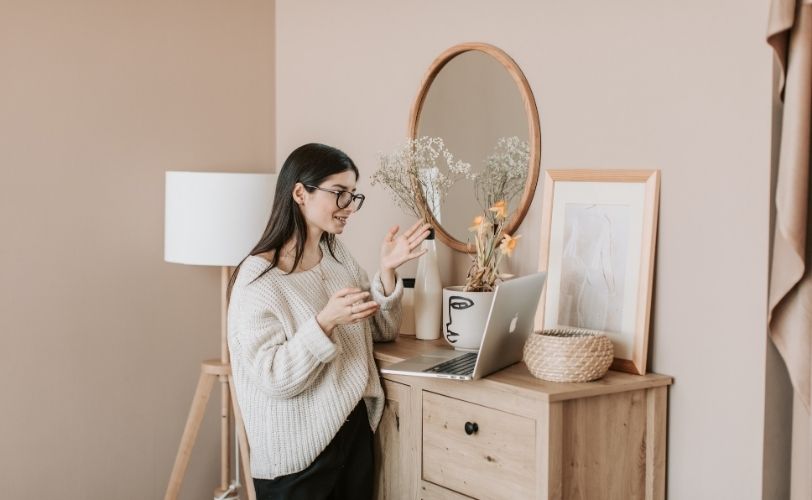5 things to consider when learning online
The landscape of learning has been changing for some time, but when the coronavirus pandemic hit in 2020 it quickly shifted further into the online space. Whether we wanted to learn how to bake sourdough or marketing skills for our small business, we turned to the Internet.

And why wouldn’t we? With a wealth of information at our fingertips and a growing population of online educators, it’s an easy way to broaden our horizons, build new skills and push ourselves forward, both personally and professionally. Approaching this can however be a little overwhelming. If you Google something you want to learn, chances are you’ll be inundated with learning options.
To get the most out of our learning, it’s important to go into it with our eyes open, aware of how we learn best and how we can take what we learn and put it into practice. To help with this we sat down to talk with online educator Vix who helps personal brands grow through her courses and membership community, Grow & Glow.
As a previous primary school teacher and self-described ‘life long learner’, Vix is in the perfect position to guide us through the world of online learning. Here we discuss five things to consider when learning online.
1. The benefits of investing in yourself
Sometimes the first hurdle we come up against is being able to invest in education, whether it’s an investment of money, time or energy. We may feel guilty, or like we simply don’t have the time, but what are the benefits of investing in yourself? Vix shares benefits both her and her membership community have noticed.
“Every single time I’ve taken a course, or done a period of life coaching with someone, it’s taken me to that next level. It’s given me that next boost of confidence, it’s given me that next skill that I can then go on and apply, so I’m a huge fan of learning myself.
And similarly with the Grow & Glow members, they come to us as a community because they know where they want to get to but they’re just not quite sure how to get there.
“And yep, you could spend hours Googling, searching Pinterest, reading every blog post, article and book possible – or you could invest in a course or a programme over a shorter period of time and not only does that help you with your knowledge, but it also helps you as a person because I think sometimes when we actually invest in ourselves, we take it more seriously.”
This mindset shift is key. When we invest in ourselves, we’re acknowledging that we deserve this learning and by handing over money, we often give ourselves a sense of accountability as we feel more determined to get the most out of our investment.
2. Different learning styles
Once you’ve decided you’re ready to invest, it’s helpful to consider how you learn best. We all learn in different ways and identifying your learning style can help you get the most out of your investment. Vix tells us about different learning styles you may identify with and how to know which is right for you.
“I always go back to when I was a primary school teacher and we were taught about visual, auditory and kinesthetic learning. Some people prefer to learn because they see something being done and they can replicate it, some people prefer to learn if they can hear and listen to the words, and then some people prefer to learn by doing.
“I think that’s a good thing to reflect on – have you perhaps taken a course that’s all visual and at the end of it you were just like ‘wow, I didn’t learn anything there’? Because it may be that you needed to actually do the doing for it to sink in properly.
“We’re all different, but generally I find the best way to learn is to give something a go and to make a mistake and go ‘ooh, that didn’t work, I’m going to try it a different way’.”
Ultimately this comes down to self-reflection and thinking back to previous learning experiences (this could even be at school) and thinking about how you tend to learn best and what element sunk in the most for you.
3. Choosing the right course and teacher
Knowing what learning style suits you best can really help when it comes to choosing the right course/programme for you. Vix explains that passive courses which are self-led (meaning you take them in your own time) can be best for those who tend to get overwhelmed and perhaps need to take things at a slower pace. Whereas live courses, where you work with an instructor at certain intervals, can be better for those who need a little more accountability.
“Then also there’s the difference between group courses and one-to-one learning,” Vix says. “Some people prefer one-to-one because they get the sole attention of the instructor and they can get more bespoke feedback.
“I’m more of a fan of group programmes because I feel like in those programmes, not only do you get the feedback from the instructor, but you get it from everybody else in the group as well. And when you can see what everyone else in the group is applying in what they’re learning, sometimes that sparks something in you that you didn’t know before.”
When it comes to getting to know a teacher, Vix notes that following them online can be really helpful as often they’ll teach through social media, blogs, podcasts and other platforms to help you get a taste of how they work. If something resonates with you and you’re learning from what they offer for free, you can generally feel safe in the knowledge that you’ll also learn from their paid offerings.
4. Staying engaged during the learning process
When it comes to the actual learning, staying engaged and motivated can be tough. Vix recommends checking in with the course you’re planning to take – if you need more accountability for example, does this course or teacher provide that in any way?
Reflecting again on your learning style can help, “I remember being at Uni and if I just sat and listened to a lecture, at the end of it I would have forgotten everything that had been said. But if I sat and took notes, and in those notes wrote myself some reflective questions, that helped it sink in more.” Vix explains.
Noting the teacher’s role here, Vix says it’s important for the teacher to share how they’ll hold space for your learning and how the course is structured to keep you motivated.
5. Putting what you’ve learnt into action
It can be easy to get stuck into research and learning mode, but how exactly can we take what we’ve learnt and put it into practice? Vix explains that this part can often be influenced by our own confidence and belief in ourselves.
“Sometimes learning can be overwhelming because it can highlight what we didn’t know. Then when we look at this and think ‘oh my gosh, I’ve got all of this to learn’, that then makes us feel like we don’t know anything. So then it becomes a confidence issue, putting it into practice.”
Talking about how we can overcome this, Vix says small bursts of consistent action can serve us better than waiting until the end of the course when we have an intimidating to-do list. These smaller actions will build up over time and you’ll reach your objective and feel more confident as a result.
Taking the above into consideration will set you up for success when it comes to learning online and ensure you get the absolute most out of the experience. So the only question now is… what are you waiting for?
Follow Vix on Instagram @GrowWithVix and learn more about her community at growglow.co. If this chat inspired you to start learning, we definitely recommend checking out Vix’s work and also heading to our events section where you can browse workshops, courses and events hosted by life and business coaches.

Find a coach dealing with Motivation
All coaches are verified professionals




